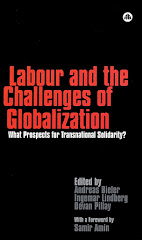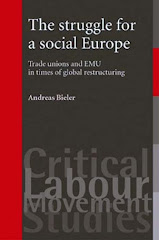The
problem of corruption – whose corruption?
Traditionally, corruption is associated
with African dictators living in luxury mansions while their people endure
conditions of abject poverty. As Naomi Fowler, however, made clear, this is
only possible because of the secrecy in the banking sector of developed
countries, which allows these dictators to stash away their money in secret
accounts in countries such as Switzerland. In fact, the majority of tax havens
are actually located in OECD countries, generally described as ‘clean
countries’, when it comes to corruption.
 |
| Photo by Ryan Morrison |
As the former Nigerian Education Minister Professor
Aliya Babs Fafunwa said in 2005 during negotiations to secure the repatriation
of assets stolen by former Nigerian President Sani Abacha, ‘it is rather ironical that the European
based Transparency International does not think it proper to list Switzerland
as the first or second most corrupt nation in the world for harbouring,
encouraging and enticing all robbers of public treasuries around the world to
bring their loot for safe-keeping in their dirty vaults’ (quoted in Christensen 2007: 4).
In other words, ‘corrupt money’ is only
possible, because of secret bank accounts in clean countries. This is well
reflected in the financial secrecy
index of the Tax Justice Network, which highlights who are the really
corrupt countries in the global political economy.
Corrupt
money and the role of the UK
The UK considering the role played by
the City of London, the three Crown Dependencies (Jersey, Guernsey and the Isle
of Man) and 7 of its 14 Overseas Territories (including the Cayman Islands and
Bermuda) is at the heart of this well-oiled machine of tax avoidance, tax
havens and ultimately corruption. In a research
report for the Public and Commercial Services Union (PCS) in 2014, Richard
Murphy concludes ‘that the UK’s tax gap may now be £122 billion a year’ (Murphy
2014: 2), ‘tax gap’ referring here to the sum of tax that could be
collected, but is not. This enormous sum is much higher than what the UK
government currently inflicts on the poorest members of British society through
its austerity cuts.
When trying to explain why the UK government
does not attempt more sincerely to close the tax gap, Naomi Fowler refers to
the way in which political party funding depends on the City of London.
Equally, the father of the current Prime Minister David Cameron uses tax havens
in his business dealings, as does the Deputy Prime Minister Nick Clegg. Banks
are simply not prepared to give up secrecy, which is at the heart of their
profits, and their close relationships with the political world ensure that
there is little political pressure applied on them. The finance sector is
simply too deeply embedded in the political hierarchy.
This is also reflected in the ‘revolving
door’ between politics and finance. Dave Hartnett, the former head of HM Revenue & Customs,
responsible for negotiating the favourable deals for Vodafone, Goldman Sachs
and other large corporations, now works for HSBC and is responsible for
advising the Ukraine on how to set up its tax system.
What
future for tax justice?
What does the future hold for tax justice
internationally? Naomi Fowler’s outlook was rather pessimistic. ‘We are experiencing a
deregulatory race to the bottom, in which countries compete with each other
over attracting companies through lowering corporation taxes,’ she argued. Unless
the issue of tax justice is addressed, we may end up with an end to corporation
tax as such. Further losses in tax would inevitably result in further cuts in
public services and corporate welfare may replace the welfare state for citizens (see also The
Tax Justice Network October 2014 Podcast). It is the fight against such a
future, to which the Tax Justice Network is committed when lobbying political
parties and informing the general public.
In discussions of Naomi Fowler’s
presentation, CSSGJ colleagues queried
whether it was actually adequate to explain the insufficient efforts by British
governments against tax avoidance simply through referring to the funding of
political parties by wealthy donors from the financial industry. Is there not
something more systemic within capitalism, which pushes large TNCs to increase
their profits by whatever legal and at times illegal means? If so, then more
change would be necessary than simply new governments and laws. The capitalist
social relations of production as a whole would have to be questioned.
Be that as it may, Naomi Fowler’s
presentation highlighted the importance of tax justice for developed and
developing countries alike. The Tax Justice Network is leading this important struggle.
Prof. Andreas Bieler
Professor of Political Economy
University of Nottingham/UK
Andreas.Bieler@nottingham.ac.uk
Personal website: http://andreasbieler.net
2 April 2015
Prof. Andreas Bieler
Professor of Political Economy
University of Nottingham/UK
Andreas.Bieler@nottingham.ac.uk
Personal website: http://andreasbieler.net
2 April 2015













No comments:
Post a Comment
Comments welcome!